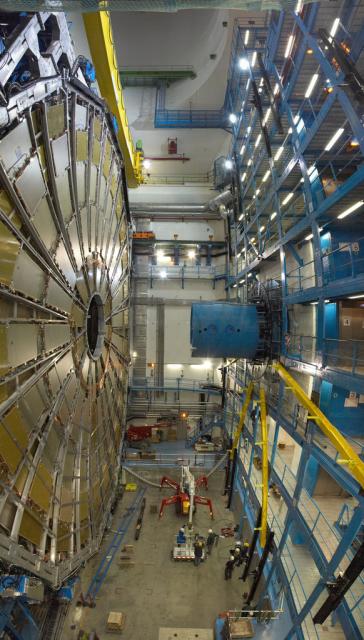
The giant particle detector, Atlas, nearing completion in 2007 (part of the large hadron collider at CERN).



I originally intended this to be a bland summary of the postulates of quantum mechanics. As usual, the story grows in the telling. Once started, I realised that quantum mechanics had been subject to some significant renovations since I learnt the subject in the 1970s. Its home, though, is still Hilbert space. I remain bemused that the most fundamental of physical theories (we are led to believe) is based on something so banal as a linear vector space. How different from, for example, general relativity with its infinitely rich manifold structure. Notwithstanding this, the last quarter century has seen the subject reveal yet more of its strangeness.
The work of Bell and others in the 1960s, coupled with increasingly impressive experiments in the decades which followed, drove home the message that the quantum weirdness was not about to go away. The fatally flawed algebraic 'proofs' by von Neumann and others purporting to show that hidden variables were impossible gave way to the far more convincing approach of Bell, which allowed experiments to kill hidden variables instead. As regards Einstein-Podolsky-Rosen (EPR), has ever a scientific paper been simultaneously so wrong and yet so important?
The entanglement of physically separated parts of the same quantum state has emerged as the pre-eminent resource for future quantum technologies. Entanglement is central to quantum cryptography and also to quantum computation. Whilst the signature of entanglement is clear, the quantification of the degree of entanglement in the general case is an outstanding research topic. Consequently, item 7 in the pick list below, on entanglement, is rather longer and more detailed than the other topics.
Quantum information theory has led to some theorems remarkable as much for the lateness of their discovery, in spite of their simplicity, as for their implications. The no-cloning theorem, the teleportation theorem and the super-dense coding theorem are examples. All these are described and proved in the articles below.
The concept of environmentally induced decoherence has emerged as a candidate for explaining the long-standing mystery of the collapse of the wavepacket, the measurement problem. But decoherence is equally important as a technological constraint on quantum computers. The attempts to simultaneously develop both a highly prized technology (quantum computers) and also their basic theory is reminiscent of the nineteenth century when the increasing knowledge of thermodynamics went hand in hand with the development of steam power.
Curiously, the appreciation of the nature of entropy has also progressed over this period, as it did in the nineteenth century. Fundamental inequalities concerning the relationship between the quantum entropy of composite systems and the entropies of its parts have been proved for the first time. Entanglement also gains clarity from this perspective. It is the result of a non-classical property of von Neumann entropy: the information inherent in a part can exceed that in the whole. The whole is less than the sum of its parts.
Most intriguingly the relentless increase of the universe's entropy appears to occur solely as a result of the collapse of the wavepacket during 'measurements'. This non-unitary 'R-process', which is also responsible for the indeterminacy of quantum mechanics, is the only source of irreversibility in physics, and hence is alone responsible for the generation of entropy. Since the increase of entropy also provides the arrow of time, it would appear that the quantum measurement problem is inextricably linked to the problem of time's arrow. This goes some way to convince me that, rather than the measurement problem being a flaw in the theory, it may be its deepest truth. On the other hand, I still have a fundamental difficulty with the formulation of QM, and this is explained in the fourth article below.
Despite these impressive theoretical advances, one should be aware that the true triumphs of the last quarter century have been experimental. A summary of these technologies could form the subject of a separate review. As for this summary of the formulation of quantum mechanics, it is both surprising and gratifying to find that the subject has progressed so significantly in the last three or four decades.
Firstly, the quantum information pick list,
And also some more traditional topics,
John Preskill's Lecture notes on Quantum Computation
Mike Nielsen's PhD dissertation on Quantum Information Theory
Related links:-
Go to my work in progress Theoretical Physics: Some Choice Cuts
- the 'book' Go back to Rick's Home Page (Main Menu)
Contact me and other links

The giant particle detector, Atlas, nearing completion in 2007 (part of the large hadron collider at CERN).


